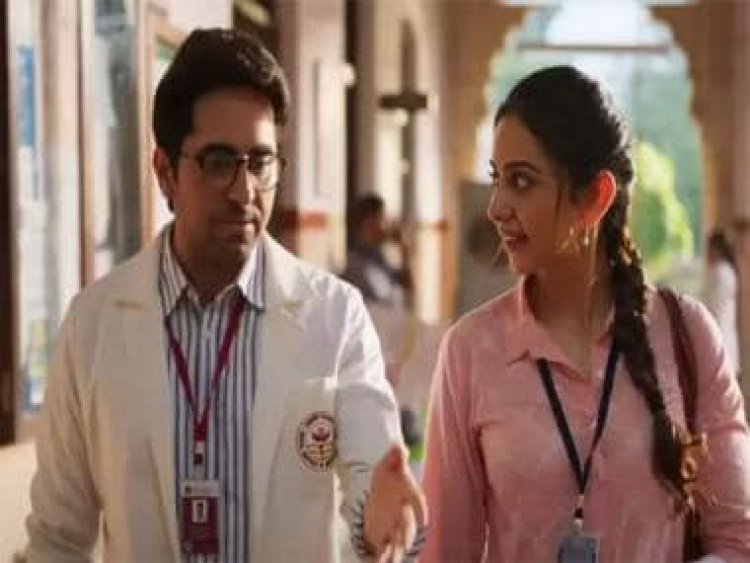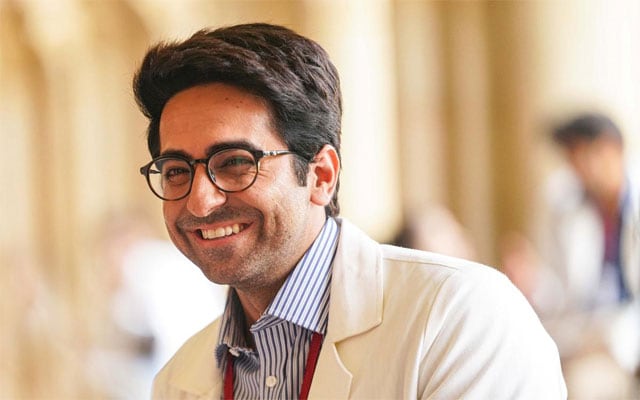Doctor G makes a strong case for embracing the softer, gentler side of masculinity
Doctor G makes a strong case for embracing the softer, gentler side of masculinity

Growing up, men are often accustomed into thinking that touch can either be sexual or aggressive. The aggressive touch manifests as horseplay between two heterosexual men which is often boisterous and rough – marked by bro fists, firm handshakes and an occasional hug. The sexual touch becomes evident in the way these heterosexual men interact with the women they are sexually attracted to. In Anubhuti Kashyap directorial Doctor G, Uday (played by Ayushmann Khurrana) discovers a third type of touch which is gentle, kinder and unlike the male touch his mentor, Dr Nandini (played by Shefali Shah) wants him to lose. Like most heterosexual men who grow up in a patriarchal set-up, Uday believed that all his interactions with women must be sexually motivated. Perhaps, that is why he was insecure of his ex-girlfriend hugging Vishal who she shared a platonic relationship with. His struggle with measuring cervix dilation during labour or simply touching his female patients stems out of his outdated views on interacting between heterosexual men and women.

The Corridor Delivery
The first time Uday found out about the third type of touch was when he delivered a baby in the corridor of the hospital. Seeing the woman shriek and scream in pain, perhaps made his saviour complex kick in. Uday refuses to wait for a stretcher and delivers the baby in the corridor – his first ever delivery that everyone in his department barring Nandini was proud of. It wasn’t the best start – as Dr Nandini pointed out, delivering human babies like cattle isn’t how a responsible gynecologist should operate. However, the corridor delivery kickstarted a journey of self-discovery for Uday that acquainted him with a more gentle and kinder form of masculinity which he thought must always be aggressive and hyper-energetic.
It is not that Uday was a changed person after the corridor delivery. While he continued to make use of the kind and gentle touch with his female patients, in his personal life, his attitude towards the women was pretty much the same, if not worse. He continued to judge his widowed mother for trying to find love and companionship. He accused Dr Fatima (played by Rakul Preet Singh) of betraying his trust after she refused to date him because she sees him as a friend. The worst of Uday’s actions was enabling the abuse and rape of a minor at the behest of his brother who forced the minor girl into an unsafe abortion. Uday’s toxic ideas of masculinity get the best of him and in the process, he loses the only friend, Chaddi, who stuck with him through thick and thin.
Kavya’s Ordeal And Uday’s Reformation
The second turning point in Uday’s journey comes in the form of Kavya, the minor his brother impregnated. Seeing Kavya struggle to deal with her unwanted pregnancy and struggle to jot down a 500-word essay on ‘the most influential person’ in her life, moves Uday. It is at this point that Uday realizes that the women in his life – his mother, Dr Fatima, Kavya are all victims to the very toxic ideas of masculinity he and his kind have held onto for so long. It almost as if seeing Kavya break down made Uday see his brother for the monster that he is and how he has unknowingly enabled his actions. That is when he sets out to make amends. Uday gets his brother arrested, sends Kavya to her guardians and happily accepts Fatima’s friendship.

What started as a simple professional advice given by Dr Nandini to Uday triggered a series of events which made him question the patriarchal ideas that he had been fed growing up. He started off a toxic heterosexual man who took pride in the fact that he doesn’t treat the women in his life like Kabir SIngh but questioned his girlfriend’s character because she went for group study with a male friend to an empath who understands how his actions have hurt people in the past and is now willing to course correct.
Ayushmann Khurrana films which are often didactic in nature and send a social message. One critique against them is that they end up reducing and watering down complex social issues without acknowledging the nuances that are at play. Doctor G addresses toxic masculinity through a heterosexual man whose views on women and gender undergo a significant change when he is forced to take up gynaecology. The film doesn’t trivialize the harmful ramifications of toxic masculinity and realistically portrays just how catastrophic aggressive masculinity can be.
Doctor G wants men to ‘lose the male touch’ and usher in a masculinity that isn’t rooted in aggression but in sentimentality. More than anything, Doctor G shows that a more kind, gentle and soft masculinity almost always delivers (pun intended).
Deepansh Duggal is an entertainment, pop-culture and trends writer based in New Delhi. He specializes in op-eds based on the socio-political and gender issues in the world of entertainment and showbiz. He also writes explainers and occasionally reviews shows in the OTT space. He tweets at @Deepansh75.
Read all the Latest News, Trending News, Cricket News, Bollywood News, India News and Entertainment News here. Follow us on Facebook, Twitter and Instagram.
What's Your Reaction?

























































